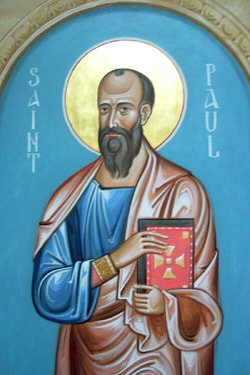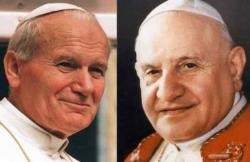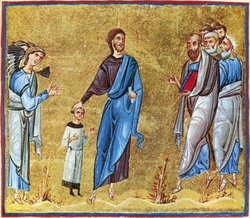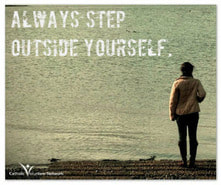|
As the Year of Faith draws to a close I can’t help but be inspired by God’s work in the life of the Church. From the outreach of Pope Francis, to the catechetical workshops in my current diocese, to the daily life stories of those in my parish, there is a momentum behind the constancy and strength of faith. St. Ireneaus writes, “A human being fully alive gives glory to God,” and how fitting it is to explore the meaning of being fully alive in the context of faith. The Church in its universal and personal faith journey aches to become more alive!
Faith is one of the three theological virtues; we are asked to believe what God has revealed to us in Himself, and to bear witness to His truth through the other two virtues of hope and love (CCC 1814-1816). By saying that we believe in God, what He has done for us in love, and to live as a witness to that understanding, we have expressed the desire to know Him. The Jesuit theologian Karl Rahner remarks, “Faith means putting up with God’s incomprehensibility for a lifetime.” Indeed, we venture into the unknown in order to know God. Growing in this way is an inexhaustible task! And we are asked to “put up” with the mystery of who God is in order to live a full life. To live a life fully alive is a challenge in this world of amusement. We are a part of a culture that is distracted by entertainment, technology, and immediate gratification. There is a focus on having control over this busy life. Self-improvement and self-care books fill shelves. Articles and talk shows tell us that we have the power to make ourselves the best that we can be. In many ways that can be positive encouragement, but without faith in a God who governs the human heart it is an empty message. Faith gives meaning to this life and shows us what is to come in the next. More than any other happiness or encouragement the world offers to feel fully alive, God speaks to the deepest desire of the heart. Pope Emeritus Benedict XVI defines faith in his translation of Hebrews in Spe salvi, “Faith is the substance of things hoped for, the proof of things not seen” (Hebrews 11:1, Spe salvi 7). Faith gives us the best momentum to live a life that is fully alive because it is a concrete reality. We may not be able to measure out faith in a measuring cup, but the value of its effects are seen in those we meet and in our own actions. It is constant, certain, and strong and gives us a foretaste of the joy of heaven (CCC 161,163). I have recently worked with a third grade class, middle and high school group, and my pastor’s adult formation class in framing an understanding of faith. Taking the lived experience of a parish community alongside what I study as a graduate student has led me to see how faith is being cultivated in my own life. I do feel more alive than when I pray for clarity and invite God into the relationships and situations of each day. By believing that he is at work in my life, I grasp at how to live the story of the mustard seed, teach the Creed, and consider the people and ideas in the life of the Church. From individuals to local communities and beyond the desire to know and love a God who desires us draws us to more fervent faith. “Great is his steadfast love toward us; and the faithfulness of the Lord endures forever,” says Psalm 117. Let us endure and live more fully in what we believe as God does in us! Sophie Jacobucci serves as a second-year Echo Apprentice in the Diocese of Manchester, NH.
0 Comments
“For in hope we were saved. Now hope that sees for itself is not hope. For who hopes for what one sees? But if we hope for what we do not see, we wait with endurance.”
-Romans 8:24-25 (full passage found here) In this passage and throughout his letters, St. Paul directs us through (not around) the darkness of suffering into the great light of faith that brings hope to those who know and love Jesus Christ. In his letter to the Philippians, he urges us to offer everything, especially our sufferings, with the hope of conforming our lives to Christ’s own sufferings so that we might in turn be conformed to His resurrection. “For creation awaits with eager expectation the revelation of the children of God; for creation was made subject to futility, not of its own accord but because of the one who subjected it, in hope that creation itself would be set free from slavery to corruption and share in the glorious freedom of the children of God.” - Philippians 3:8-10 My wife and I recently suffered through the pain-filled loss of a miscarriage. When we first heard the news we were absolutely devastated, heart-broken to say the least. Living through this experience, made me painfully aware of the fragility of life, especially life in the womb. In fact, later that evening I was scheduled to direct a pro-life youth rally for the 40 days for life. I couldn’t fathom how someone would actually voluntarily take a life from the womb of its mother. I believe this experience has caused me to suffer twice as much heart ache. I am terribly saddened because of our loss and terribly saddened because of the realities of abortion. With nothing save our Faith to comfort us and in holy surrender, my wife and I offer up our baby’s life for the conversion of hearts, especially for those considering abortion. A few weeks ago, I was praying across the street from a Planned Parenthood abortion facility when I noticed a young woman sitting in her car that was parked next door in front of the pro-life pregnancy resource center. However, I knew on this particular day of the week, the center was closed so I wondered who she was and if she needed help. After a brief interior struggle as to whether or not I should approach her car and speak with her I started walking towards her. I had been to Mass earlier that morning and I remember asking our baby, whom we named “Charlie,” to intercede for women in crisis pregnancies. I didn’t put two and two together while I was experiencing all of this but my prayer was about to be answered. The young woman in the car was in crisis and nobody, except me (and Charlie), was around to help her. I introduced myself, told her who I was (pro-life advocate) and that I was there to help her find the assistance she needed. I was able to lead her to another resource center that was nearby and assured her that there were people in this community that would be with her and support her every step of the way. I thanked her for choosing Life! For St. Paul, it is through the great acceptance of or rather surrendering to (and patiently enduring) life’s suffering, that we obtain the imperishable and eternal crown of victory (c.f. 1 Cor 9:25); a victory in his faith-filled eyes incomparable to the passing experiences of a lifetime no matter how grave. For it is true, no-thing compares to the glory that awaits us; for eye has not seen and ear has not heard what God has ready for those who love Him (c.f. 1 Cor 2:9). Bart Zalvetta is a member of the Theology Department of Skutt Catholic High School in Omaha, Nebraska The lights began to dim as I settled into my seat and a hush fell over the crowd. Sounds began to emerge from the pit in front of me as various instruments were heard tuning. Then the auditorium erupted into applause as the conductor popped into view, acknowledged the audience and struck the downbeat. With that, my first professional opera viewing experience was underway!
I recently had the opportunity to see the Washington National Opera’s staging of Giuseppe Verdi’s La forza del destino (or, The Force of Destiny, for those of us who don’t know Italian). The story follows a wealthy noble family who is struck with tragedy when the lover of the family’s daughter accidentally kills the father when a fight erupts between lover and father. The ensuing story tells how the daughter, Donna Leonora, copes with the tragedy while Leonora’s brother seeks revenge for his father’s untimely death. One of the most moving parts of the evening was when Donna Leonora, tired and distraught after running away from home, seeks out the solace of the nearby religious community. With her brother seeking to kill her, a fiancée who is now a murderer, and a father who has died, Leonora comes asking the Abbot for peace and God’s mercy. To make a long story short, the Abbot listens to Leonora, blesses her and offers her the opportunity to kneel before the cross and pray with the Blessed Sacrament. He then invites her to join their community upon which Leonora sings: Eternal Father, thy grace smiles on the rejected one, an uncommon happiness fill me: I am blessed. I feel my heart regenerate within me; Rejoice O angels, God has forgiven me! While this portrayal was dramatized, it’s no doubt that the Church can still be place of healing and restoration in our world today, especially for those who have walked away from their faith, have suffered a great deal or are simply in need of God’s mercy and peace, just like Donna Leonora. During this scene I was reminded of the words of Pope Francis in his recent interview with the Italian Jesuit journal, La Civilta Cattolica, in which he says: …the thing the church needs most today is the ability to heal wounds and to warm the hearts of the faithful; it needs nearness, proximity. I see the church as a field hospital after battle. It is useless to ask a seriously injured person if he has high cholesterol and about the level of his blood sugars! You have to heal his wounds. Then we can talk about everything else…The most important thing is the first proclamation: Jesus Christ has saved you. And the ministers of the church must be ministers of mercy above all. As apostles of Christ in today’s world we are called to help spread God’s mercy and rekindle His love to those who need it most in our world. We all know someone who is in need of God’s mercy and we can be the medics that Pope Francis speaks of in the lines above. Certainly, transformations might not be as dramatic as seen in the movies, on stage or even in stories we hear from the lives of the saints, but even the smallest ways in which we can be ambassadors of Christ’s mercy can make a world of difference for those who need it most. David Burkey is the Communications Coordinator for the Catholic Apostolate Center Growing up in a stereotypical American Catholic family, my parents always kept our faith at the center of family life. While we didn’t go so far as nightly recitations of the rosary together, I did have a very faith-centered childhood. My weeks generally pivoted around two regular Church activities: Sunday morning Mass and Tuesday night Religious Ed. We always ate dinner together as a family and prayed before the meal no matter what. When my sister and I were young, they read us stories out of our children’s Bible, and as we got older, they encouraged us to receive the sacrament of Confirmation and continue our faith journey as adults when we each went to college. Overall, I daresay they were successful: my sister and I still attend Sunday Mass on our own, and I’ve maintained further involvement in Church through the Knights of Columbus.
While my mom and dad had very different approaches to sharing the faith with us, they consistently worked as a team to make sure we had a Christ-centered upbringing. The reason for this, as I look back, is obvious: they have always had a Christ-centered marriage. Both came from Catholic families of 5 or more (Dad was one of 12!) and have always relied on their relationships with God to guide them through life’s difficulties and joys. There is always a Bible on hand, and numerous crucifixes and pictures of Mary are scattered throughout their home. The presence of God in our daily lives is something regularly acknowledged in everything we do as a family. I don’t know what kind of marriage prep they went through before their wedding, but it is clear that they understand marriage for what it is: a Vocation, a calling from God. Everything my parents do, they do for each other. Whether it was Dad helping with the laundry on Sunday mornings, Mom keeping a plate warm when Dad worked late or had a Scout meeting, or giving each other breaks from me and my sister, their lives have always been focused in on our life as a family. I once heard that the home should be like a “miniature Church”. My parents have gone above and beyond in making that a reality for our family, whether any of us realized it or not. In the Church, we always make a point of praying for Vocations to the priesthood and religious life, but I believe we’re often forgetting the other all-important Vocation to married life. That is not to say that we don’t need to pray for more holy priests, brothers, and sisters; we do! But I propose that we pray just as hard for true, faith-formed Vocations to marriage. With all the broken families we see in our society, it almost seems a miracle to meet couples who have remained faithful and totally in love. Those are the couples who, whether religious or not, view their marriage as a higher calling to give themselves totally to one another. In Gaudium et Spes (aka The Pastoral Constitution on the Church in the World), promulgated by Paul VI during Vatican II, we hear that “married people can become witnesses of the mystery of love which the Lord revealed to the world by His dying and His rising up to life again.” This speaks directly to the self-giving nature of a true Christian marriage; spouses are called to mimic the love between Christ and the Church, the bride which He died for. Any happily married couple can attest to the great deal of self-sacrifice needed to maintain a healthy marriage. What our world so desperately needs is right in front of our faces: with families splitting up left and right, marriage has been devalued to no more than a “feel good” reaction. The understanding of marriage as a calling to daily self-sacrifice must be emphasized if we are to reverse the trend of so many broken families and such a high divorce rate. My parents, who celebrate 25 years of marriage today, are one of the millions of couples throughout the world who strive to answer their daily call to empty themselves for one another as Christ did for each of us. Please join us in praying that their collective example will inspire young couples to focus their intentions on creating that same kind of self-giving love. Jay Schaefer is the Webinar Associate of the Catholic Apostolate Center, in addition to his full-time career as a Civil Engineer in Baltimore, MD. A few weeks ago, the Vatican announced the canonization date of two soon-to-be saints. Blessed Pope John XXIII and Blessed Pope John Paul II will be declared saints on April 27, 2014 and will join the ranks of thousands of holy men and women who have been declared similarly. As Catholics, we have a great devotion to the saints. And with good reason: saints are good models for us in our faith. According to the Catechism of the Catholic Church, “By canonizing some of the faithful, i.e., by solemnly claiming that they have practiced heroic virtue and lived in fidelity to God’s grace, the Church recognizes the power of the Spirit of holiness within her and sustains the hope of believers by proposing the saints to them as models and intercessors” (CCC 828). But why do we have a great devotion to the saints? What is it about these holy men and women that inspires and challenges us to live out our faith in God? From Saints Aaron and Abadios to Saints Zoticus and Zygmunt Gorazdowski, we feel a sense of connection to these men and women because, in many ways, they were a lot like us; regular people following Christ’s example in their lives. Whether they lived a thousand years ago or died just last decade, these holy men and women help us to fashion our lives so we can become better human beings and better disciples of Christ, and strive to become saints ourselves. Blessed John Paul II himself has said: “The Saints have always been the source and origin of renewal in the most difficult moments in the Church’s history.” Who wouldn’t want to follow the way of those men and women? Who are the saints that mean most to you? What saints have you sought out when you have needed to pray for help or in thanksgiving? For me, as I’ve written about before, I personally have developed an affinity for St. Monica, my patron saint. Over the years, though, I have often prayed to Saints Peter and Paul, whose feast day is the day after my birthday, as well as to St. Therese of Lisieux, Venerable Catherine McAuley, St. Ignatius of Loyola, and St. Vincent Pallotti – all patrons of schools I have attended or organizations where I have worked. I have learned about each of these saints and have appreciated the role they have in the Church, both on a larger scale and for me personally. Have you been struggling to find some inspiration in your daily prayer life? Do you want to find out more about saints that you may feel a connection to? Take a look at the Catholic Apostolate Center’s website for resources on Prayer and Catechesis, which includes information about the saints. Monica Thom Konschnik is the Administration & Finance Manager for the Catholic Apostolate Center.
They came to Capernaum and, once inside the house, he began to ask them, “What were you arguing about on the way?” But they remained silent. They had been discussing among themselves on the way who was the greatest. Then he sat down, called the Twelve, and said to them, “If anyone wishes to be first, he shall be the last of all and the servant of all.” Taking a child he placed it in their midst, and putting his arms around it he said to them, “Whoever receives one child such as this in my name, receives me; and whoever receives me, receives not me but the One who sent me.” – Mark 9:33-37
Here, we have another classic example of Jesus’ disciples screwing up. I love them for that. In my struggle to figure out how I can better receive Christ, the knowledge that these great saints also constantly screwed up keeps me from spiritual perfectionism, and instead lets me focus on growth. In this particular case, the disciples failed to discern that concern for the welfare of others needed to trump their own ambition. In my circles of Catholic emerging adults, we talk a lot about discernment, and there is an ever-growing area within practical Catholic spirituality about how to practice discerning well. We discern marriage or religious vocation; we discern where to begin a job search; we discern whether even to begin that job search or go on for more education. We discern our roles within changing friendships. It’s so common that among my friends, discernment is even tossed around as a joke, such as when we “discern” whether we should order another pizza for the game watch party. However, what struck me in this Gospel passage is the fact that the disciples clearly had to practice something else before moving on to discernment. The prerequisite to discernment must be a well-formed conscience. The disciples had no idea what they should have been talking about along the road, but they were ashamed when Jesus asked what their conversation was – they knew, deep down, that who was the greatest among them certainly wasn’t a question worth their consideration. Was that gut feeling present when the conversation started? The Catechism of the Catholic Church §1779 explains the need for introspective vigilance, and quotes the advice of St. Augustine: It is important for every person to be sufficiently present to himself in order to hear and follow the voice of his conscience. This requirement of interiority is all the more necessary as life often distracts us from any reflection, self-examination, or introspection: “Return to your conscience, question it… Turn inward, brethren, and in everything you do, see God as your witness.” (Saint Augustine) If we are truly going to discern as often as we profess about matters great and small, we need to attend to this interiority. Prayerful discernment, or choosing between good things, is hard enough. It becomes much harder if you can’t see what is not of God and can’t rule that out immediately. Today is the memorial of Teresa of Avila, a great contemplative. She certainly believed that when you don’t distract yourself with things that aren’t worth filling your mind, that’s when you can hear God. In Teresa’s meditation on the Song of Songs, she warns her religious sisters against “false peace” with oneself - a “peace” that anesthetizes and atrophies the soul. She took the time to identify nine kinds of false peace, which can stymie our growth into the disciples that God created us to be and which Christ calls us to be. We are each like the disciples in this Gospel: imperfect, but called by Christ to recognize when we could have done better. When we recognize the wrong questions, we can begin to discern which are the right ones. The disciples didn’t remain at peace with their pride, and grew into some of the greatest servants of others. For myself, I pray that I can stay away from the false peace that would make me complacent with the children and adults whom I serve as a parish director of religious education. Lord, help me to receive You in them. Laura Berlage serves as Director of Religious Education for Incarnate Word Parish in the Archdiocese of St. Louis. Basketball and world peace… what do the two have in common?
As an athlete, I could tell you a lot about the positive benefits of athletics. There are many physical, emotional, mental, and social benefits and developments that come with participation in sports. As a softball coach for 8 years, I can also tell you about the many success stories that my players have had because of youth athletics. Through my years coaching, there is one story in particular that sticks out in my head, it was about 5 years ago, my Junior year of high school. One young girl, about the age of 9, joined my Little League softball team. She was one of the most difficult kids I had ever coached; between the arguing over every piece of instruction she was given, the fighting with the other girls, and the bad sportsmanship, which resulted in many games spent on the bench, we struggled. I was so frustrated with her, until things changed about 10 weeks into the season, when her grandmother came to me to say thank you. She told me that this girl’s father had left her and her mother wanted little to do with her. Her grandmother signed her up for softball to get her out of the house, and into something to bring her out of herself. She told me that the time, attention, and patience I gave this girl helped her cope with the immense difficulties she was facing at home. I went home and cried that night. To be honest, I would have never experienced any of this if my father hadn’t pushed me to influence other girls the way I had been influenced as a 7 year old girl by my coaches. He taught me to turn what I love into something I could give back to the community. I never fully realized the immense positive effect youth athletics had on children until that day. Thankfully, someone else did. Two men, Brendan and Sean Tuohey started the program Peace Players international. This organization used youth athletics, specifically basketball, to bring together developing communities and bring kids out of their homes to do something to create a better world for themselves. They created PPI – Peace Players international. What I want readers to bring back from this is the power of turning what you love into something greater than yourself. Brendan and Sean Tuohey turned what they were passionate about into a program working towards a bigger goal – international social justice. While God may not call you to something as large-scale as that, maybe he’s calling you to change the life of the little girl on the neighborhood softball team. Each person has a different calling to help change the world… what’s yours? Casey Tisdell is Senior Psychology Major at the Catholic University of America in Washington, D.C. This past Sunday, October 6th was “Respect Life Sunday,” a day designated by the United States Conference of Catholic Bishops to kick of their Respect Life programming for the year. When I went to Mass this weekend, I offered extra prayers for the protection of the unborn and the protection of life until natural death. I did not really think about it any more than those few minutes at Mass.
Later in the evening however I had a general meeting of the Catholic Daughters of the Americas on my campus. Our chaplain spoke briefly about Respect Life Sunday and offered this group a challenge. He spoke about the good things that the pro-life ministry does (March for Life, sidewalk prayers, raising awareness, etc), but also pointed out the need for more resources for women actually in the position to be making decisions about whether or not to end their pregnancies. He spoke about how too often, the decision to end a pregnancy is made because it is the easiest. He challenged us to re-think our views on the pro-life ministry. In the United States, the pro-life ministry in the mainstream focuses a great deal on the changing of laws that allow abortion. This goal is a good one, a necessary step to ending the practice of abortion in the United States. But what our chaplain said when he gave us this challenge resonated with me and made me think. There should be a larger goal of not only trying to amend laws to prohibit abortions, but also trying to offer resources to pregnant women. I firmly believe that abortion should not be legal, but until there is a time where that is the case, shouldn’t we work just as hard to make abortion not as common? Of course this still leaves the question of how: how do we as Catholics strive to make abortion something less common? On the large scale this involves better counseling resources for pregnant women unable to care for their unborn children, showing these women that there are options available that are alternatives to abortion. But how do we, on a smaller, individual scale help reach this goal? That question I do not have an answer to quite yet. But it certainly will be on my mind and in my prayers. For an inspiring story of one man’s change of heart about his daughter with Down’s Syndrome, watch this video below: http://www.faithit.com/this-guy-writes-a-confession-letter-to-his-down-syndrome-daughter-that-will-break-your-heart-in-100-ways/ Rebecca Ruesch is the Blog Editor for the Catholic Apostolate Center  It certainly surprised me to find out that one of Christianity's most popular saints never actually said this, nor did he write the "Make me an instrument of Your peace" prayer! While these often-used quotes are very much in the spirit of St. Francis, the sentiment was likely inspired by a line from the Franciscan Rule, in which he said, "Let all the brothers, however, preach by their deeds." We all know St. Francis as the saint of simplicity, of appreciation for God's creation, and, of course, preaching to the birds. He was known in his lifetime as a man of great poverty, giving up all that he owned for the poor. In fact, as a young man, he stripped off his clothes in the middle of Assisi and renounced all worldly possessions, including his inheritance from his father. From that point on, Francis spent his life in service to the Gospel and God's people, spreading the message of Christ by the way he lived his life and interacted with others. It comes as no surprise, then, that our current Pope, a Jesuit, made a nod to this charism of simplicity and authenticity in choosing the name of Francis. It is, I believe, a stark reminder to the Church universal of exactly what the New Evangelization is all about: encountering Christ in our everyday lives and bringing Him to the world in the simplest ways possible. There is no better delivery of the Gospel than to treat every person we meet with simple Christian charity, as though he or she were Christ Himself. We are, after all, made in His very image and likeness! Two years ago while on pilgrimage to Rome, I had the great blessing of taking a day trip to Assisi. Many of us have heard the story of the San Damiano Cross, through which Francis heard the Lord say, "Rebuild my church, which as you see has fallen into ruin." Spending a day of prayer before that same cross, walking the hilly streets Francis traversed so many times in his life, and praying in the Porziuncola (the chapel Francis built with his own two hands), was like a step right into the life of the Saint. It inspired me in a very profound way to always remember that the goal of our faith is quite simple. If we live our lives with true authenticity to the Gospel, we rarely have need for words. Looking, then, to the example of Pope Francis and his namesake, today's Feast reminds us to live our faith simply, to find God in the simplicity of nature, the beauty of His creation, and in the face of each person we meet. It is how Christ lived his life, and how we are called to live ours. With that reminder, may we all be the instrument of His peace that our world so desperately needs us to be. Jay Schaefer is the Webinar Associate for the Catholic Apostolate Center.
As emerging adults in the Catholic Church many times we are asked the question why are you Catholic? or why do you remain Catholic? Sometimes asked from friends who fell away and sometimes asked by others in the Church that are surprised to see you present and active. We, as a Center, would like to share with you, at the end of each month, why we are Catholic and where it is that we find joy in our faith.
“We are an Easter people and ‘Alleluia’ is our song!” -St. Augustine of Hippo I first heard this quote several years ago, but it wasn’t until recently that I began to understand it more fully. Some of you may be wondering why I am writing about Easter in October, but this is exactly my point! We arealways an Easter people, and we should constantly direct ourselves towards the joy of the Resurrection! Nothing orients one towards Easter quite like participating in RCIA. This year, for the first time, I am helping to prepare catechumens, candidates, and confirmandi for full initiation into the Church during the Easter Vigil mass. This group is distinct from other RCIA groups because it is composed entirely of college students, both graduate and undergraduate, who are studying at the Catholic University of America in Washington, D.C. Every Thursday night, the ten or twelve students come together to learn about the faith through catechetical sessions presented by a member of the theology faculty or one of the chaplains of the university. Some students come straight from rugby practice, others from study sessions in the library, and a few grad students sacrifice time away from their young families to join us. What brings them all together in the campus ministry lounge on Thursday nights is a nascent love for the Church and a deep desire for the grace imparted through her sacraments. To put it simply, even in October they are oriented towards the joy of Easter. The Second Vatican Council’s Pastoral Constitution on the Church in the Modern World (Gaudium et Spes) opens with the following words: The joys and the hopes, the griefs and the anxieties of the men of this age, especially those who are poor or in any way afflicted, these are the joys and hopes, the griefs and anxieties of the followers of Christ. Indeed, nothing genuinely human fails to raise an echo in their hearts. In the next few days, the Church celebrates not only the joy of “All Saints” and the hope of “All Souls,” but we also share in the sorrow of the families and communities whom the faithful departed have left behind. It is this sense of community that calls others into the fold. As members of the Church we are called to share in the burdens of our fellow man, but we do so with the recognition of what God-made-man has already done for us. However heavy our loads, we have hope in Christ who shouldered all of our burdens and sacrificed himself for our sins. We share the grief of others because Christ has shared in our grief; but we must also share the hope and joy that we have in Him . . . the same hope and joy that brings twelve college students together for an hour each week on a busy school night to reflect upon the beauty of our faith. Where do I find joy? In the catechumens who long for Easter – even in October! – and yearn to become members of our community of faith. Leave it to the neophytes in the faith to teach us something about Christian joy! Easter in October? I’m all for it! Brett Garland is a Collaborator with the Catholic Apostolate Center. This post was originally published by the Catholic Apostolate Center in October 2012 While we cannot have the Church without having community, I have realized that a lot of my spirituality also depends on my own initiative and personal relationship with God. I am learning to see God everywhere in the world, but particularly in frequent mass, exercise, music, the Rosary, art and silence. As persons of faith in our society, it is important to have strong foundations that enable us spread the love of our work to those most in need.
Here are a few elements I find crucial: 1. Prayer - Prayer is the foundation of faith and spirituality. The beauty of prayer? There’s no right or wrong way to pray. While some of us turn to more traditional forms of prayer such as praying the Rosary or praying with Scripture, exercise, meditation, writing or service work can also be forms of prayer. Every morning, I like to say a prayer offering up everything I will do, think and feel up to God. This even includes my weaknesses and anxieties. The key is to set aside regular time for prayer in whatever way you most connect with. What kind of time do you have? Do you have 20 minutes? 10? Five? One? Whatever time you can, set that aside for regular prayer. See what happens. Spiritual Tip: Have a smart phone? Check out the “pray as you go” section of the free Laudate app. It’s an Ignatian podcast of daily scripture, song and reflection that is only ten to fifteen minutes long and is great to listen to on your commute to work! 2. Silence - This one is often overlooked….or seemingly impossible. But silence enables us to truly think and to let those thoughts mature. Just like prayer, think about how much time you can set aside for some moments of silence, even if that just means closing your eyes and taking a few deep breaths during your work day. Spiritual Tip: “We need to find God, and he cannot be found in noise and restlessness. God is the friend of silence. See how nature - trees, flowers, grass- grows in silence; see the stars, the moon and the sun, how they move in silence... We need silence to be able to touch souls.” -Mother Teresa 3. Spiritual direction - I like to think of a spiritual director as a type of faith-based therapist. I’ve learned that I can think and pray and meditate all I want, but it’s helpful to have an outside perspective that enables me to see outside of myself. This can be a priest, religious, trained spiritual director or leader in your community. It’s helpful to have a spiritual director you trust that isn’t necessarily a friend or family member. That way, this person can bring in a fresh, outside perspective to guide and direct you along your spiritual journey. Spiritual Tip: Browse spiritual directors they way you would browse for shoes for an important occasion. Spiritual directors, like shoes, are not “one size fits all,” so be sure to have some preliminary discussions with several people before settling on one. 4. Retreats - It’s typically recommended that we do a retreat per year. Retreats are exactly what the name implies: a retreat from the world, from our lives or from our typical schedules. They are important in allowing us to focus our thoughts and energy on the divine in a way that our regular schedule hardly permits. The beauty of retreats is that they can vary greatly. There are silent retreats, community retreats, family retreats, staff retreats, yoga retreats, weekend retreats, day retreats—you name it. Think about what one may be right for you at a certain time. Spiritual Tip: This once a year thing sounding impossible with your schedule? Try a daily three minute retreat from Loyola Press by clicking here. 5. Eat, sleep and exercise - Seriously. God gave us minds and bodies as well as spirits. So make sure to take care of all of you! We can’t be of much help to others if we ourselves are not being taken care of. Shut off your laptop or TV at least 30 minutes before getting to bed; studies show that the light from these screens can keep you up or leave you restless. Read a book instead. Take a ten or fifteen minute walk during lunch. Add some more green to your life. Recycle. Do whatever you need to feel rested and taken care of. Think of the phrase, “Behold God beholding you…and smiling.” Rest with that. We are the Church. And we are called to support, love and stand with others. Our work as people of faith enables us to do this in unique and beautiful ways, but we need to make sure we are healthy and strong in our own spiritual lives in order to truly be living, breathing instruments of God. How will you commit to living intentionally today? Kate Flannery is a former Catholic Volunteer Network Communications intern. This post was originally written and posted on the Catholic Volunteer Network Blog. For more Catholic Volunteer Blog Posts please visit the CVN Blog. The Catholic Apostolate Center is proud to partner with the Catholic Volunteer Network by developing faith formation resources for volunteers and alumni, assisting in its efforts to provide and advocate for faith-based volunteerism and collaborate in many additional ways. |
Details
Archives
July 2024
Categories
All
|
About |
Media |
© COPYRIGHT 2024 | ALL RIGHTS RESERVED











 RSS Feed
RSS Feed